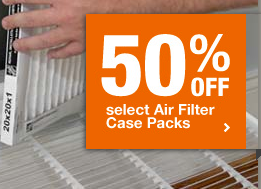This post may contain affiliate links. Read our disclosure here.
I spotted a nice deal from Home Depot for cases of Air Filters at 50% off. I confess, in asking my husband what we should order, I realized I didn’t know much about air filters at all. After seeing that the price for a case of 12 can vary drastically from $17 up to $100 or more, I spent some time researching how to get the most bang for my buck.
Here’s what I found so we can all make more informed decisions when stocking up on air filters:
Air Filter Size
The easiest way to find out what size you need is to go check the one you have right now. I wrote it down and emailed it to myself just in case I ever forget. Now I can look it up instead of going back through the trouble. This is especially important if your AC unit is in an out of the way place like a crawl space or basement.
FPR Rating
In doing my homework, I learned that you could sort the air filters by their FPR rating, but apparently this is a metric that Home Depot uses try to compare the products. It really doesn’t mean a whole lot though and you are better off choosing based on the MERV index.
MERV Rating
Merv stands for minimum efficiency reporting value. This is the industry rating that tells you the level of filtering you can expect. The higher the number, the more efficient it is at removing particles from the air. The scale is 1-16.
Anything above an 8 is considered a “commercial” application so don’t let them up-sell you on a more expensive filter with a MERV of 12 because it’s not really going to do much for you.
I needed a 16x25x1 air filter and there were 15 options to choose from on HomeDepot.com. After comparing the price per filter to the MERV and FPR ratings, I found that although the price seemed to go up with FPR rating, the MERV ratings on most of the filters are actually the same… I could choose a MERV 6 for $3 a filter or a MERV 11 for $5-$8 per filter. I’ll let you guess which one I picked!
Do you have any tips for how to choose an air filter?



